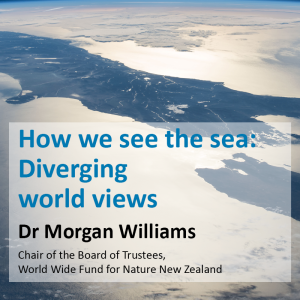Each day during the month of April, the Institute will feature one of the 30 ‘perspectives’ from the One Ocean report. These short articles include a diverse range of views regarding oceans management in New Zealand. Enjoy!
Today:
Dr Morgan Williams, Chair of the Board of Trustees, World Wide Fund for Nature New Zealand
How we see the sea: Diverging world views
Fifteen years ago, when Parliamentary Commissioner for the Environment, I published a report: Setting Course for a Sustainable Future: The management of NZ’s marine environment. It delved into many aspects: our values (Māori and Pākehā), state of our knowledge, research investment, economic importance, Treaty implications, legislation and more.
We identified knowledge gaps, legislative complexities and opportunities for improvement and recommended that a task force facilitate crafting a new course for sustainable marine stewardship. Why such a recommendation? It was my belief that changes would only be possible though building consensus and promoting widespread understanding of many values, interests and rights at risk. A collective understanding of how we see the sea – how we value all its attributes and not simply its extractive ones – was needed.
Despite some progress towards better marine stewardship, such as more small marine reserves and Aotearoa Fisheries Ltd developing a sustainability strategy, a collective understanding is still lacking.
Ecological systems management is increasingly becoming an arena where values clash. In New Zealand’s case that has been well illustrated by the foreshore and seabed saga, a difference held so deeply it contributed to the birth of a new political party! In contrast, recent protests against offshore oil drilling were an expression of wider citizen concerns (not just Te Whānau-ā-Apanui) while the Act to limit protests highlighted the growing citizen/government gap. It was one more example of people deeply concerned about how our endless pursuit of resource fuelled economic growth would affect future generations. Can our marine ecologies really cope? Probably not, but 15 years on we urgently need a process that crafts a more sustainable relationship with our seas.






















![20160906 McGuinness Institute - TacklingPovertyNZ Workshop – Far North Flyer [FINAL]](/wp-content/uploads/20160906-McGuinness-Institute-TacklingPovertyNZ-Workshop-%E2%80%93-Far-North-Flyer-FINAL-1-50x50.png)